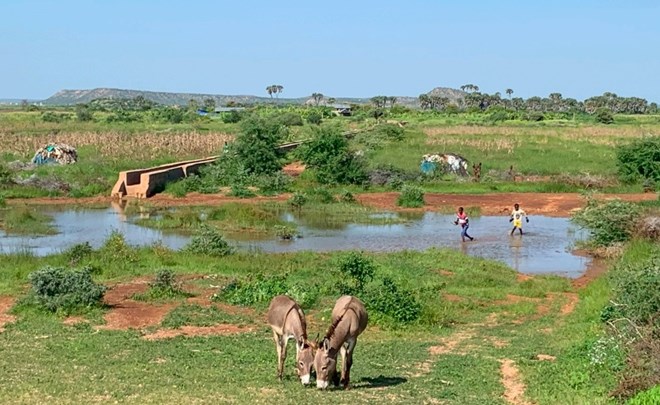
Wednesday September 18, 2024

Stagnant pools of water caused by late 2023 flooding disrupt irrigated agriculture along the Genale River in Dolo, Somali Region, Ethiopia. (Photo: Radhika Singh/IWMI)
Mogadishu HOL) — A worsening water crisis in Ethiopia's Somali Region has put over 350,000 people at risk, according to a new report by CGIAR. Refugee and host communities are grappling with failing water infrastructure, escalating climate change, and dwindling resources, highlighting the dire need for immediate action to protect lives and livelihoods.
Initially designed for around 100,000 people, water systems in the region are buckling under the pressure of serving a population more than three times larger. Refugee camps, originally built to accommodate smaller groups, now face a relentless influx of people fleeing conflict and climate-related disasters in Somalia. As temperatures rise—projected to increase by up to 3.7°C by 2080—droughts and floods are wreaking havoc on water sources, becoming more frequent, leading to water supply systems frequently breaking down. Communities, left with no choice, turn to contaminated sources for survival."The water crisis has become a matter of survival," says the report.
The study predicts that the region's temperature could rise by as much as 3.7°C by 2080, exacerbating heatwaves and water scarcity.
Floods and droughts compound the crisis. In 2023, unprecedented flooding submerged water infrastructure, leaving communities without clean water for weeks. During dry seasons, river levels drop, making it nearly impossible to pump water where it is needed most. The situation is further exacerbated by rising fuel costs, making water extraction and treatment an expensive endeavour.
Host and refugee communities, often bound by shared cultural and religious ties, find themselves in conflict over scarce resources. Tensions escalate when water supplies run low, leading to unauthorized private connections that compound shortages for essential services like hospitals and schools.
The report advocates for anticipatory action to mitigate the impact of climate extremes. This includes the identification of new clean water sources, such as boreholes, and the exploration of solar-powered water utilities to reduce operational costs and dependence on unreliable diesel sources. While finding viable borehole sites has been a challenge, the report suggests continued efforts to explore alternative water sources and recycling methods, such as greywater reuse for household gardening.
Water harvesting systems, upgraded infrastructure, and community trust in climate forecasts are pivotal components of this strategy.
The study highlights the need to merge traditional and modern meteorological knowledge to build community trust in weather forecasts. Collaboration between meteorological teams and local elders in areas like Gode has improved disaster preparedness, offering a blueprint for other regions facing similar challenges.
While the water crisis is pressing in Ethiopia's Somali Region, it reflects broader challenges across the Horn of Africa. Climate change, resource scarcity, and migration are inextricably linked, often driving conflict and displacement. The report calls for a concerted effort among local governments, humanitarian agencies, and communities to implement adaptive water management.